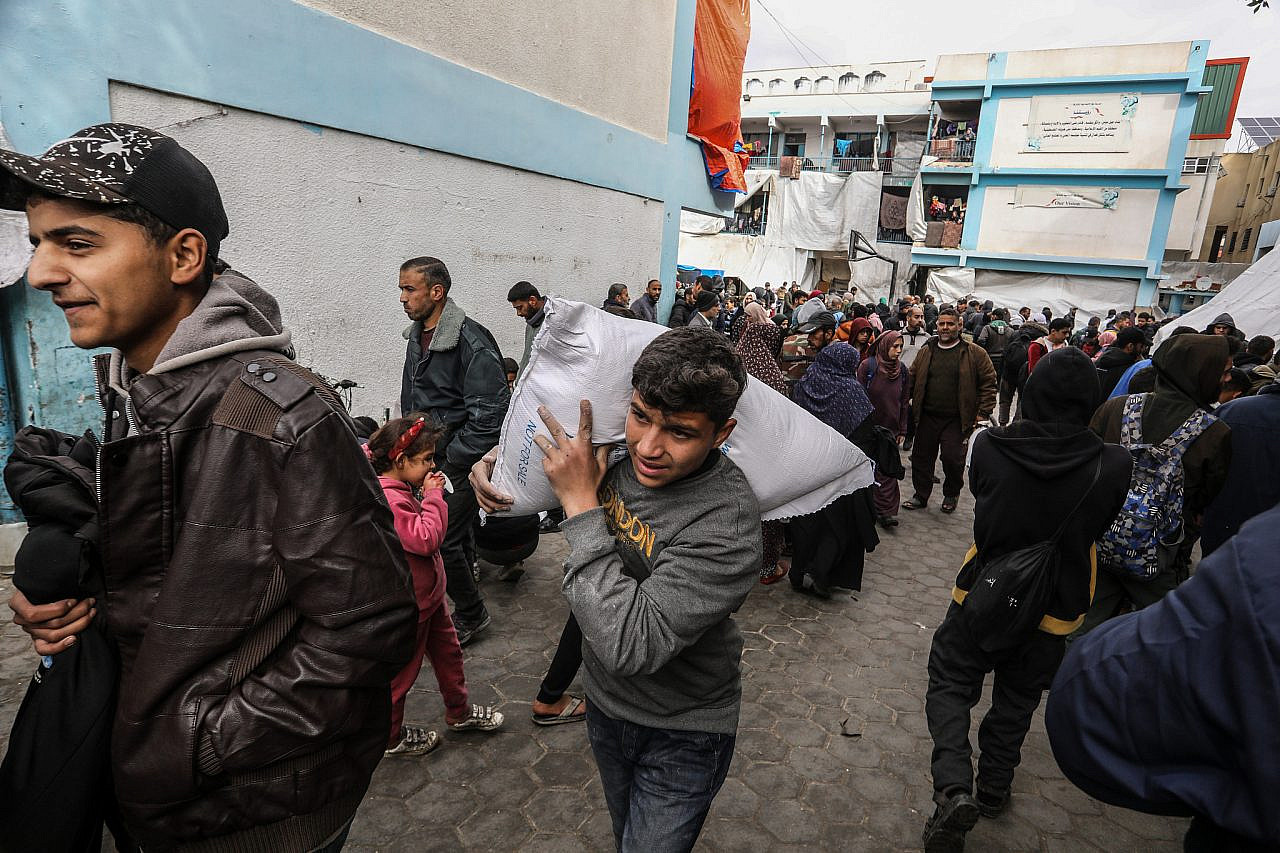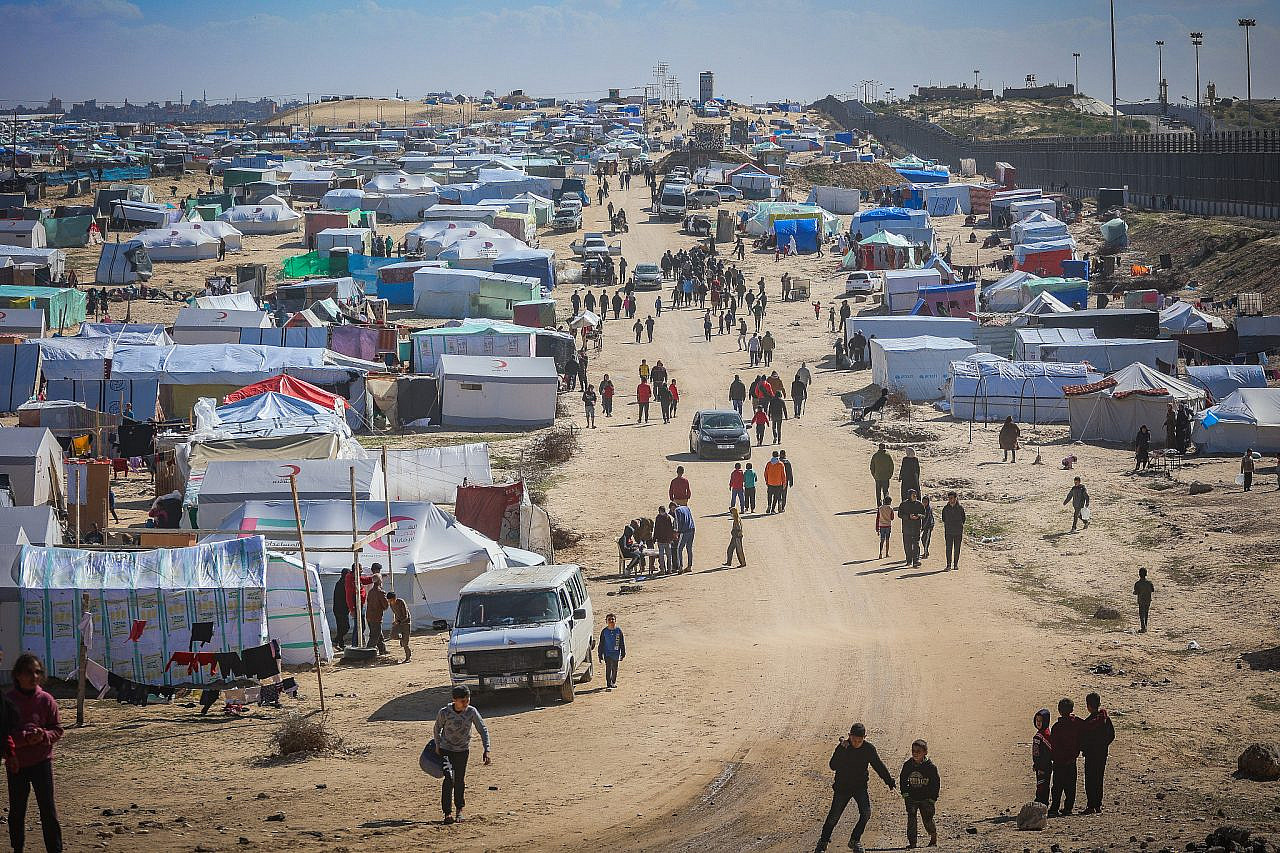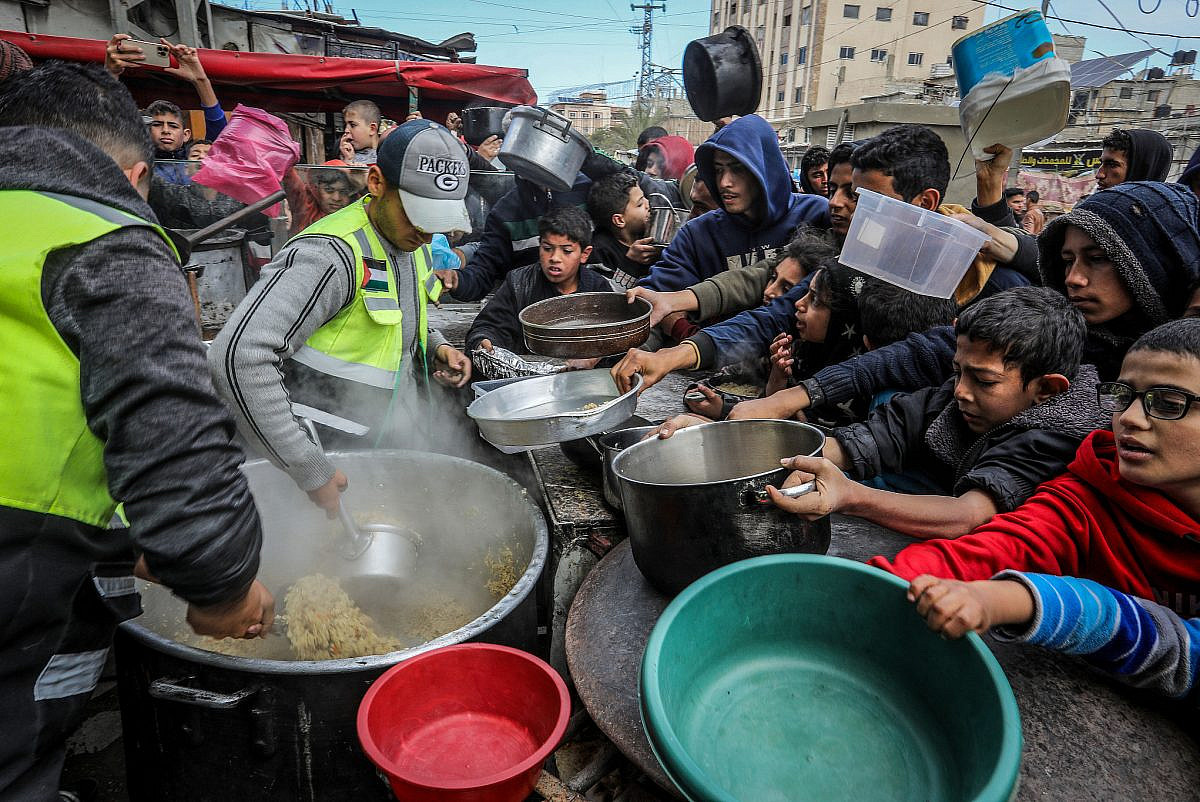Khalida Abu Ras, 55, is living in a tent in Gaza’s southernmost city of Rafah. One of an estimated 1 million Palestinians — around half of the Strip’s population — now residing in the city, she was forced to flee her home in northern Gaza at the start of the war and has been homeless ever since. “I cannot describe the suffering we are experiencing,” she told +972. “We are living the worst days of our lives.”
Beit Hanoun, her former home in the northeastern corner of the Gaza Strip, was one of the first places to become uninhabitable when Israel’s bombardment began. “Belts of fire surrounded the area day and night,” Abu Ras recounted. “I fled from death with my five children and my grandchildren.”
Over the subsequent months, Abu Ras and her family moved from the very north of the Strip to the very south, but each place they stopped in had two things in common: there was no respite from Israel’s bombings or invading forces, and there was a severe lack of food. The same is true for Rafah: “Every three days we receive food assistance, but it is only assistance — a simple meal that does not satisfy a family of 15.”
Israel’s response to the Hamas-led October 7 attack on its southern communities involved swiftly shutting off the electricity and water it usually supplies to Gaza, as well as sharply restricting the entry of food, fuel, and humanitarian aid — thus intensifying an already crippling 16-year blockade. As a result, basic supplies across the Strip have dwindled while their prices have skyrocketed, rendering what little food is available unaffordable to many.
“A kilo of salt, which used to cost one shekel, now costs 20 shekels or more [around $5.50],” Abu Ras explained. “A box of yeast, which cost only 5 shekels, now costs 25 [nearly $7]. We cannot buy anything.”

International aid organizations are warning of catastrophic levels of hunger. A report by The Integrated Food Security Phase Classification (IPC) placed Gaza’s entire population in a situation of acute food insecurity, which it defines as “crisis or worse.” According to the UN, 80 percent of all the people around the world facing famine or catastrophic hunger are in Gaza. Palestinians in the north of the Strip have told CNN they are eating grass and drinking polluted water, because no aid is reaching them.
The UN Relief and Works Agency (UNRWA) — the main organ providing aid and shelter for millions of displaced people inside Gaza, and which has just had its funding slashed by Western countries amid allegations that 12 of its 13,000 staff in Gaza participated in the October 7 attack — stated earlier this month that “humanitarian aid alone cannot meet the essential needs of [Gaza’s] people.” And every day for the past week, dozens of Israeli protesters have been attempting — with some success — to block the passage of what little aid Israel has authorized to enter the Strip from its territory.
‘No one can afford to buy anything for his family’
Salem Al-Murr, a 35-year-old father of three from Gaza City, has been displaced three times since the start of the war. With each displacement, finding and purchasing food has become an even greater challenge.
“We have not eaten fruit since the beginning of the war,” he told +972. “The price of meat has doubled. A kilo of beef was 35 shekels, now it’s 90 [around $25]. These prices are unreasonable. We cannot afford them under the harsh conditions of war. One house now has more than 30 people living in it. How can we buy enough food at these prices?”
Al-Murr and his family are now living in a tent close to the Egyptian border. “We don’t have anywhere else to go to,” he lamented. “I can’t believe I’m living in a tent. It has been a painful journey.”

Despite now living among hundreds of thousands of displaced people in what has become a tent city, and being in the closest possible proximity to the aid convoys entering Gaza from Egypt, Al-Murr and his family are still suffering from extreme hunger. “Sometimes I go to the market to buy food, but I come back empty handed because everything is too expensive,” he explained. “When we ask why prices are so high, they say that the goods are missing from the market and there is no alternative [supply source].
“We have been without work for more than three months, we have no income,” Al-Murr continued. “We are forced to eat one meal a day — the canned goods that we get from aid organizations. No one can afford to buy anything for his family. I see children here crying from hunger, including my own children. We cannot tell them that there is no food. This is a war of starvation and displacement; it is a war against the people and a punishment for them.”
Most read on +972
People in Gaza are increasingly turning to social media to demand the entry of more aid so that they can buy food for their children and save them from starvation and famine. Meanwhile, the impossibly high prices have even prevented hospital patients from accessing food.
Khaled Nabhan, from the Jabalia refugee camp in northern Gaza, was hospitalized with severe fractures in his foot as a result of an Israeli airstrike on the camp. He was first taken to Al-Shifa Hospital in Gaza City, before being transferred to the European Hospital in Khan Younis. There, he explained, he only eats one meal a day — “labneh or bahteh [rice with milk], and it’s not enough. I’m hungry for hours every day. My family tries to buy some food in the area, but everything is too expensive. There is no treatment, no food, no shelter, nothing to enable us to endure this painful war.”




